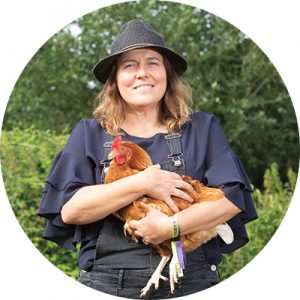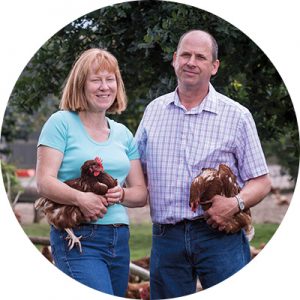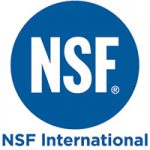Farmers Weekly Awards: Poultry farmer finalists 2019
With the egg market under pressure, making a decent margin is a tall order for most producers this year.
The two finalists in this year’s poultry category are taking very contrasting approaches to give their businesses the best chance to survive and thrive.
See also: Meet the 2019 Farmers Weekly Awards finalists
The 2019 Poultry Farmer of the Year finalists:
• Susie Macmillan, The Mac’s Farm, Ditchling, East Sussex
• Nigel and Sue Smith, Stonecote Farm, Bedale, North Yorkshire
The judges:
• Shraddha Kaul, independent judge and British Poultry Council executive
• Phillip Crawley, last year’s winner and co-owner of Sunrise Eggs
• Philip Clarke, Farmers Weekly executive editor
Susie Macmillan
 The Mac’s Farm, Ditchling, East Sussex
The Mac’s Farm, Ditchling, East Sussex
The Mac’s Farm is home to 18,000 organic layers housed in three sheds, with an emphasis on high bird health and welfare.
The business is very much a family affair, with husband Danny and their children all actively involved.
Three flocks are run at a time through a “multi-age” system, necessary to ensure eggs are available at all times for direct sales.
The farm is crossed by numerous footpaths, so Susie has adopted a policy of engaging with the public at every opportunity, to educate them about family farming and free-range egg production.
Business focus
Securing a fair price is a priority for Susie, as egg yields are never going to be as high with organic birds as non-organic.
In the past, this has been achieved by selling on contract to Noble Foods, with additional direct sales of own-brand Mac’s Farm Eggs.
But, following a drop in the packer price, the decision was taken to sell wholesale and increase direct sales too, which now account for half the trade.
A better price was being achieved for mediums and large, but then one major wholesaler walked away, leaving Susie with a massive surplus. As part of the response, she held a “pick-your-own” day, offering tea and cake as a further inducement.
“We were astounded when over 1,000 people turned up to buy our eggs, and they keep coming back.”
The farm has also diversified into events and camping. While this brings in revenue of its own, it also attracts customers for the egg business.
Technical performance
Working closely with advisers from Humphrey Feeds and St David’s Vets, Susie has achieved a significant improvement in organic egg production, lifting output in one shed from 276 eggs a bird at 72 weeks, to 325 eggs a bird over three flocks.
One change has been to let the birds out earlier – almost as soon as they arrive. This enables them to build up immunity to whatever they encounter on the range. A better ration has also been introduced, biosecurity stepped up and a new lighting programme introduced.
The farm is also in the process of installing perches in the flat-deck houses while – since going wholesale – there is less pressure to push the birds for larger eggs.
Hen welfare is paramount, and the farm has a derogation to allow beak tipping as a precaution against the high number of hot air balloons and helicopters that fly over the farm.
Susie also uses Eggbase software to monitor performance.
Environment and social
Maintaining a high profile on social and national media is important for Susie, who has appeared on national TV to encourage the use of pullet eggs and persuade the public to buy more “mediums”.
In addition, the farm hosts numerous visits and open days during the year, and Susie makes egg donations to local charities and food banks.
“We have had challenges from vegans, but it is always best to engage and explain, rather than to demonise,” she adds. “Honesty is always the best policy – even with larger, more intensive systems. People appreciate that.”
Rehoming is another feature, as Susie is loathe to see spent hens heading to the slaughterhouse. “We started this 10 years ago and, by working with Fresh Start for Hens, we are able to rehome every bird we deplete.”
Looking to the future, the plan is to consolidate and hopefully secure a long-term contract with wholesalers, to have better control of the price.
What the judges say
The Mac’s Farm does a superb job in combining community engagement with a profitable organic egg business. Breaking away from their packer to sell wholesale presented challenges – which they have met head on.
Summary
The judges liked…
• Engagement with the public
• Ambassador for the small family farm
• High health and good feathering of older hens
Farm facts
• 36ha of grassland and trees
• Seven part-time staff
• Part of the family-owned Grassington Rangers
• Direct sales through The Egg Shack
• Diversified into camping and events
The numbers
• 250 regular direct sales customers
• £5 farmgate price for a tray of 30 mixed eggs
• 5,874 followers on Facebook • 22 years of organic production
• 1,000 visitors who come to the annual farm open day
Nigel and Sue Smith
 Stonecote Farm, Bedale, North Yorkshire
Stonecote Farm, Bedale, North Yorkshire
Representing the fifth generation of Smiths to farm in the Bedale area of North Yorkshire, Nigel first got into egg production in 2010 as a way of making a living on his own 36ha holding, away from the family home farm.
The unit, which Nigel runs with his wife, Sue, is home to 16,000 free-range Lohmann hens, producing top quality eggs for packer Noble Foods.
The birds are housed in a self-built shed which now incorporates a multi-tier system – this ensures the birds have ample perching, feeding, drinking and nesting stations.
They range over 8ha of grassland, which is planted with 1.6ha of broad-leaved trees and features numerous enrichments, meaning the birds qualify for Happy Egg status.
Business focus
Operating in an unsupported sector of agriculture, the emphasis for Nigel and Sue is to manage risk and protect margins from the inherent volatility.
This is achieved in a number of ways, but few have been more effective than signing up to the Tesco Feedlink contract, which links the price of egg to the cost of feed.
This has paid dividends at a time when free-range egg prices have fallen in response to an oversupplied market, especially for medium-sized eggs.
Nigel and Sue put great emphasis on forging strong relationships with their supply chain, which they believe helps protect their margins. They regularly play host to retailers, being something of a “show farm” for their packer.
“We like to interact with them, though it means our farm needs to be audit-ready at all times,” says Nigel.
They are also members of the fledgling Co-op Farming Group, sharing best practice.
Technical performance
Attention to detail and meticulous record-keeping is everything for Nigel and Sue – the key to top performance.
Examples of this include providing their layers with the same blue ropes to peck as they had at the pullet rearing stage, to netting of the base of the stanchions in the shed to discourage floor eggs.
Investing more than £200,000 in a Big Dutchman multi-tier unit has also helped raise output and reduce feed intake, while increasing bird numbers from 10,000 to 16,000. They weigh and blood sample their birds every 10 weeks.
Nigel and Sue are also always willing to experiment. “We like to try something new with every flock,” says Nigel, who is currently trialling the additive Pidolin in rations to improve shell quality in late lay.
The last flock of Lohmann birds achieved 340 eggs a hen at 72 weeks, some 28 eggs ahead of the breed standard.
Environment and social
Nigel and Sue are very conscious of their environmental impact.
As well as extensive tree planting, they have invested in solar panels to help power the poultry house, installed LED lighting and use rainwater for turnaround. They have also undertaken a full carbon footprint assessment and source raw materials as locally as possible.
They have also gone into local schools to talk about farming, and installed a viewing window at one end of their shed to give visitors sight of the birds without jeopardising biosecurity.
“I like to show the birds at 40-50 weeks old,” says Nigel. “They are still well feathered, while showing them much younger is misleading.”
Looking to the future, Nigel and Sue plan to take on additional staff to free up their own time. This will either be achieved by putting up more units on another site, or by adding value through developing a farm shop and encouraging visitors.
What the judges say
Nigel and Sue Smith have achieved great things on their medium-sized, free-range egg unit – forging strong links with their buyer, investing for the future and raising laying hen performance to the highest level.
Summary
The judges liked…
• Close attention to detail in every financial and technical aspect
• Strong links with the end buyer, helping to counter volatility
• Impressive bird performance, beating breed standards convincingly
Farm facts
• Owner-occupied unit close to main trunk road
• Multi-tier laying system in home-built shed
• Small direct sales facility
• Extensive tree planting on range
• 250 ewes and 18ha of arable
The numbers
• 8ha range
• 16,000 layers
• 340 eggs per bird in last flock
• 125g daily feed intake per bird
• 2 part-time workers
Sponsor NSF International
 “The UK poultry sector is among the largest in Europe and contributes significantly to our economy. We produce some of the best product in the world that is enjoyed by many each week – we are delighted to sponsor this award.”
“The UK poultry sector is among the largest in Europe and contributes significantly to our economy. We produce some of the best product in the world that is enjoyed by many each week – we are delighted to sponsor this award.”
Anita Roberts, director agriculture, EMEA, NSF International
